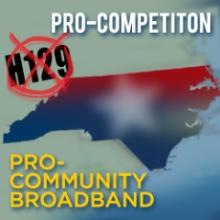Another community in North Carolina has passed an official resolution opposing the Time Warner Cable bill to limit local authority to decide whether to build their own broadband network. Albemarle joins a growing list of other resolutions we have been able to collect, listed below this text.
A RESOLUTION OF THE CITY OF ALBEMARLE URGING MEMBERS OF THE GENERAL ASSEMBLY AND GOVERNOR PERDUE TO OPPOSE 11129 AND S87 (LEVEL PLAYING FIELD/LOCAL GOVERNMENT COMPETITION ACT) AND ANY LEGISLATION WHICH WOULD PROHIBIT OR LIMIT THE ABILITY OF LOCAL GOVERNMENTS TO PROVIDE BROADBAND OR ANY OTHER COMMUNICATION SERVICES OR SYSTEMS
WHEREAS, Senate Bill 87 and House Bill 129 have been introduced in the 2011- 2012 Session of the General Assembly of North Carolina; and
WHEREAS, these bills do not provide a level playing field to cities, towns and counties, but greatly hinder local governments from providing needed communications services, including public safety networks, and especially advanced high-speed broadband services, in unserved and underserved areas; and
WHEREAS, these bills impose numerous obligations on cities and towns that private broadband companies do not have to meet; and
WHEREAS, while private companies declare top-quality broadband service is cost prohibitive, the United States continues to lose ground to other nations in broadband access, user cost and growth in number of users, falling behind the United Kingdom, Korea, France, Japan, Canada, Estonia, and now China, each of which provides Internet access at speeds that are some 500 times faster than what the private providers in the United States and at less cost; and
WHEREAS, the bills would prohibit North Carolina cities and towns from using federal grant funds to deploy or operate locally-owned or operated broadband systems, thereby denying N.C.





